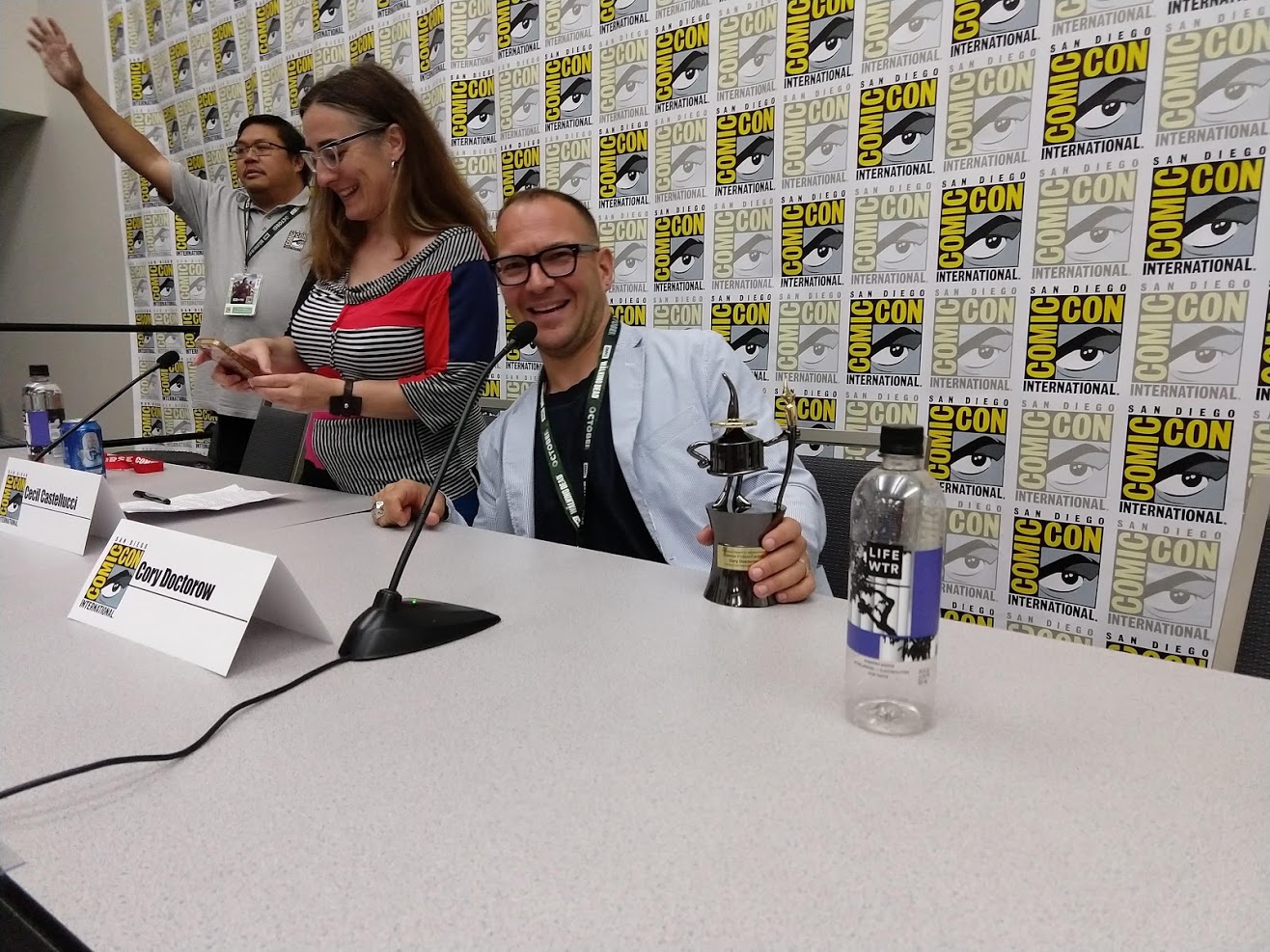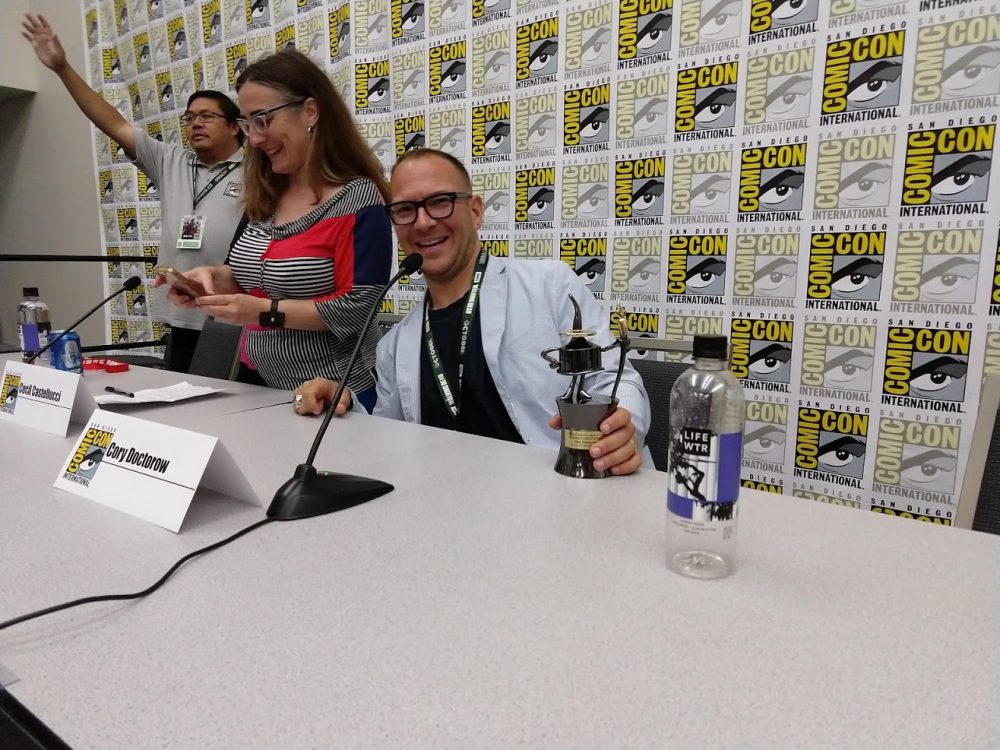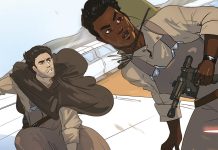
On Friday, Comic-Con International presented to Cory Doctorow an Inkpot Award for achievement in science fiction and fantasy. He accepted the award with genuine surprise and appreciation before leading the room in a deeply thoughtful conversation about emerging trends in the world and how best to navigate the challenges of the internet age.
Here are some excerpts from the panel, moderated by the very talented Cecil Castellucci, in Doctorow’s own words.
On Education
“The idea of interdisciplinarianism or informal credentialing is just dead, except in certain very high demand professions. So right now, if you can credibly claim to know two facts about cryptocurrency or AI you can get a job. But anywhere where there isn’t one of those insanely tight labor markets, you really do have to have gone through this incredible set of hurdles that has left you intellectually deadened and also financially ruined. I had a Fulbright and taught at USC for a year and I had these undergrads who were so smart. And to get into USC, they not only had the privilege of giving fifty thousand dollars a year to the Board of Regents there, you also have to have had a 4.0 from your first day of ninth grade. And so the way these kids got into USC is they showed up to their first day of ninth grade in September in some town and their guidance counselor said ‘If you’re going to go to a Big Ten or an Ivy, all of your electives need to be things you’re already good at so you get 4.0’s in them.’ And all they did for four years in high school is study stuff that they happened to have some small proclivity for when they were fourteen. And then of course that prefigures what their AP courses will be and then what their undergraduate programming would be and when they get into undergrad at USC they are told by their advisors that they can’t take electives outside of their disciplines…These kids were shielded from anything that they might turn out to be more interested in than the thing they happened to be interested in on the first day of grade nine and they graduated with like three hundred thousand dollars in debt and enormous deep expertise in something that they weren’t particularly interested in, and it likely stopped being a profession somewhere along the way. It really is a remarkable thing we’ve done. We have arrived at quite a juncture.”
On Technology
“I’ve always been very sure that the destiny of technology would be intimately bound up with human destiny. Although we did a very narrow range of things on the internet in the nineties, I could see that expanding to the point where very soon everything we did would either involve (or likely require) the internet. Internet regulation, the policy contours, what we allowed companies to get away with, what we allowed governments to get away with…We have a technology space that is dominated by people who don’t know anything about technology. The dominant mode of political discourse in internet policy is some lawmaker who doesn’t understand the internet insisting that because he wants something it must be possible. And when we say it’s not possible, he just says ‘Hey nerds, just go nerd harder!’…It was and remains the dominant mode of discourse in technology today. It’s really bad.”
On Climate Change
“I have this theory of change that I call the Peak Indifference Theory, which deals with these problems where the cause and effect are separated by a lot of time and space. Like smoking: If smoking gave you a tumor the first puff you took, no one would take a second puff. I was a smoker for like fifteen years. The problem is that it’s really hard to get exercised about something where the cause and effect are so far apart. It’s why climate change is so hard to address. But if things are genuinely dangerous, you accumulate debt when you fail to deal with them. We are experiencing climate debt now. We just had this worldwide heat wave…At a certain point, the flight flips, from trying to convince people that there’s a problem to trying to convince people that it’s not too late to do something about it. You saw this with smoking cessation, where there was this long campaign of disinformation where people could credibly kid themselves and say ‘Well maybe it’s not going to give me cancer’ or ‘Nobody really knows’ but at a certain point it gets undeniable. And then the argument is ‘Well it’s too late, I’m just going to enjoy myself while I can’. You have to convince people that it’s not too late.”
On Antitrust Laws
“Tech was the first industry to grow up after Reagan got rid of antitrust…All of these other industries they could have been just as rapacious as tech but they were full of lawyers who had grown up under real vigorous antitrust and whenever anyone would say ‘You know what we should do? This incredibly evil thing!’ they would go ‘Ugh, when the DoJ hears about that we’re going to be in really big trouble.’ And it took them awhile to re-curb their instincts. And what there was in tech were a bunch of lawyers who hadn’t grown up watching their colleagues lose their jobs and their careers by underestimating the DoJ’s willingness to slap down any competitive behavior. And so they were policy entrepreneurs…who were like ‘Who says we can’t get as big as possible? Who says we can’t buy all of our competitors? Who says we can’t corner our market? Who says we can’t have ninety to ninety five percent of the market?’ And now, forty years later, everyone looks like that. That’s why there’s like two tractor companies left, and two seed companies left, and one big movie studio chain left, and four studios and four record labels and five publishers. They all look like tech, right? Tech was just like the canary in the coal mine. And it had nothing to do with tech, it had to do with the dismantling of antitrust. So if there’s a thing that we can and must roll back, it’s antitrust.”
On Surviving the Apocalypse
“The first easy answer to what happens in the apocalypse is that everyone runs to the hills and hunkers down with their guns and their MRE’s and whatever. But you can’t shoot germs. If the sanitation isn’t working, you’re dead. Right? You are definitely, definitely dead. So the way that we make the world work is by cooperating. The people who are hunkered down in their bunkers waiting for the actual heroes of the apocalypse to get the sewage works running again, those people if they are lucky won’t be killed by listeria because other people will have done the hard work. Otherwise they’re just as dead as anyone else. I really feel like all of our survival is predicated on our ability to work together. To become superhuman by doing more than one person can do.”
On Conflict in Fiction
“Even people who love each other deeply have a hard time agreeing on what the best way to do something is. And that is such a rich source of conflict in fiction. The easiest conflict is bad guys arguing with good guys. You know what’s much harder? Winning the argument at Christmas dinner. Because you will never have a good Christmas dinner again if you win the argument. Right? Falling out with people you love is really hard. And so making that the focus of fiction is really dramatic. It’s much more dramatic. It’s much more interesting than villains being bested by good guys with feats of rhetoric or martial skill.”
Cory Doctorow (right) accepts an Inkpot Award before a discussion moderated by Cecil Castellucci.









